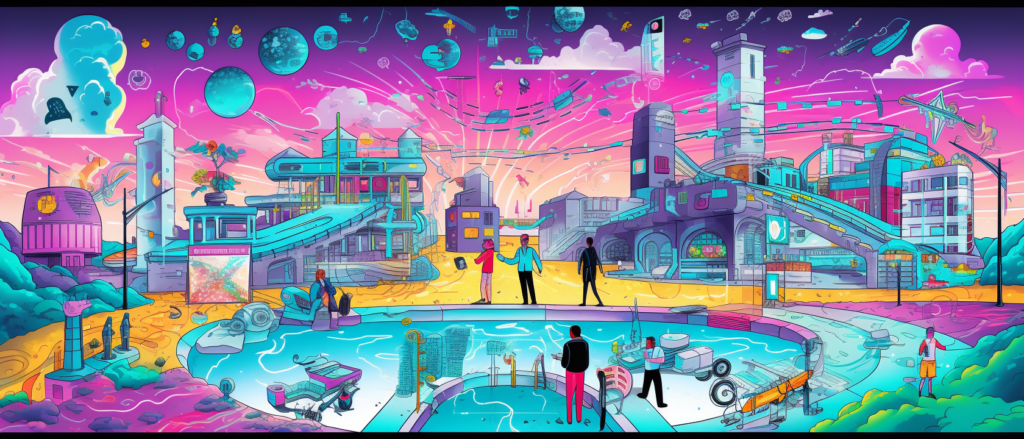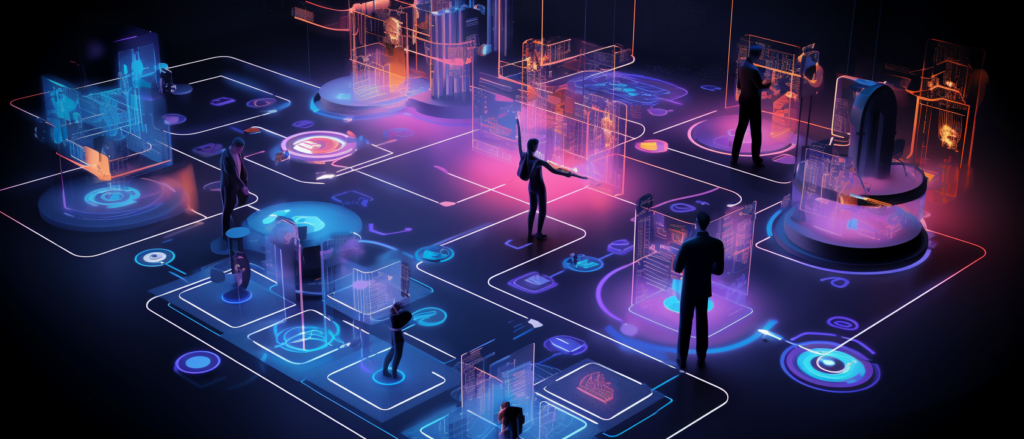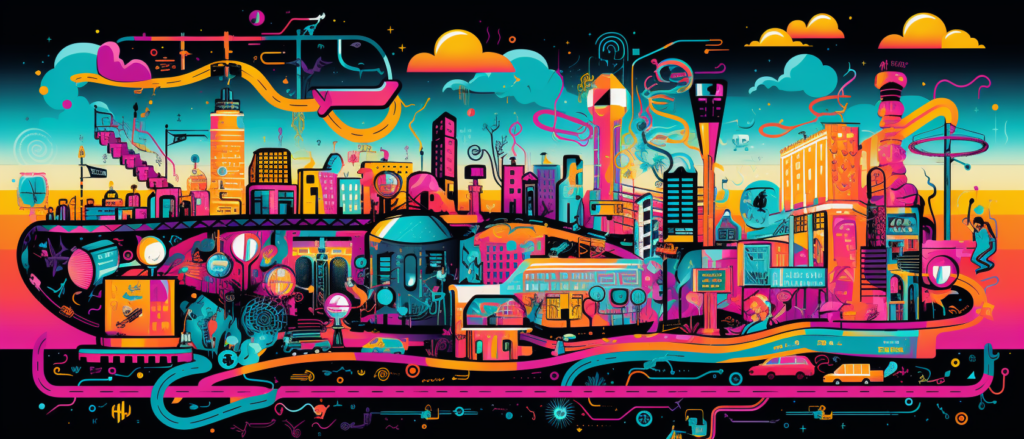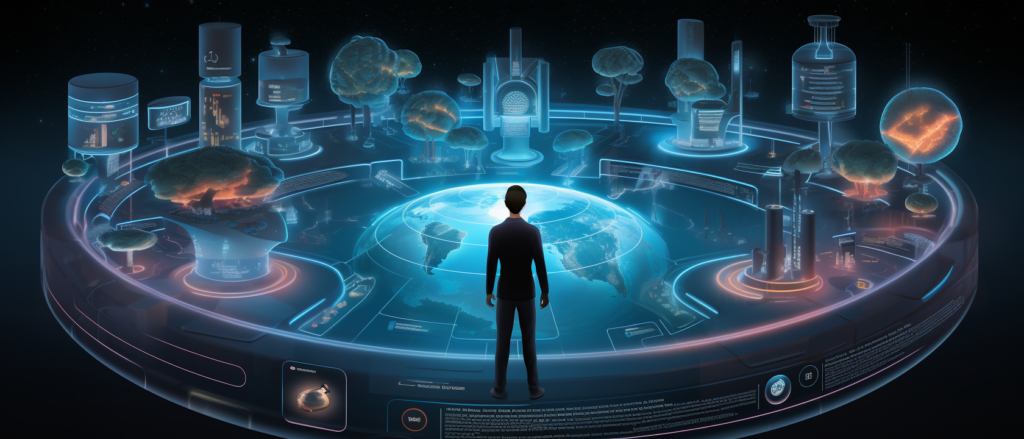Key Takeaways
✅ Personalization and Customer Insights: With AI, companies map out each step a customer takes, turning simple interactions into rich stories. Isn’t it a bit like unlocking a treasure trove of preferences, desires, and feedback, all ripe for the picking to enhance experiences and spike sales?
✅ Predictive Analytics and Optimization: Imagine if you could see the future. Well, AI doesn’t need a crystal ball – it uses data to forecast customer choices, helping you shape the customer journey like a sculptor poised over clay, molding it into a masterpiece that beckons success.
✅ Real-time Engagement and Automation: How can you be everywhere at once? With AI, it’s possible to meet customers at every turn, offering them just what they need, exactly when they need it. Automation turns customer service into a 24/7 convenience store – always open, always on point.
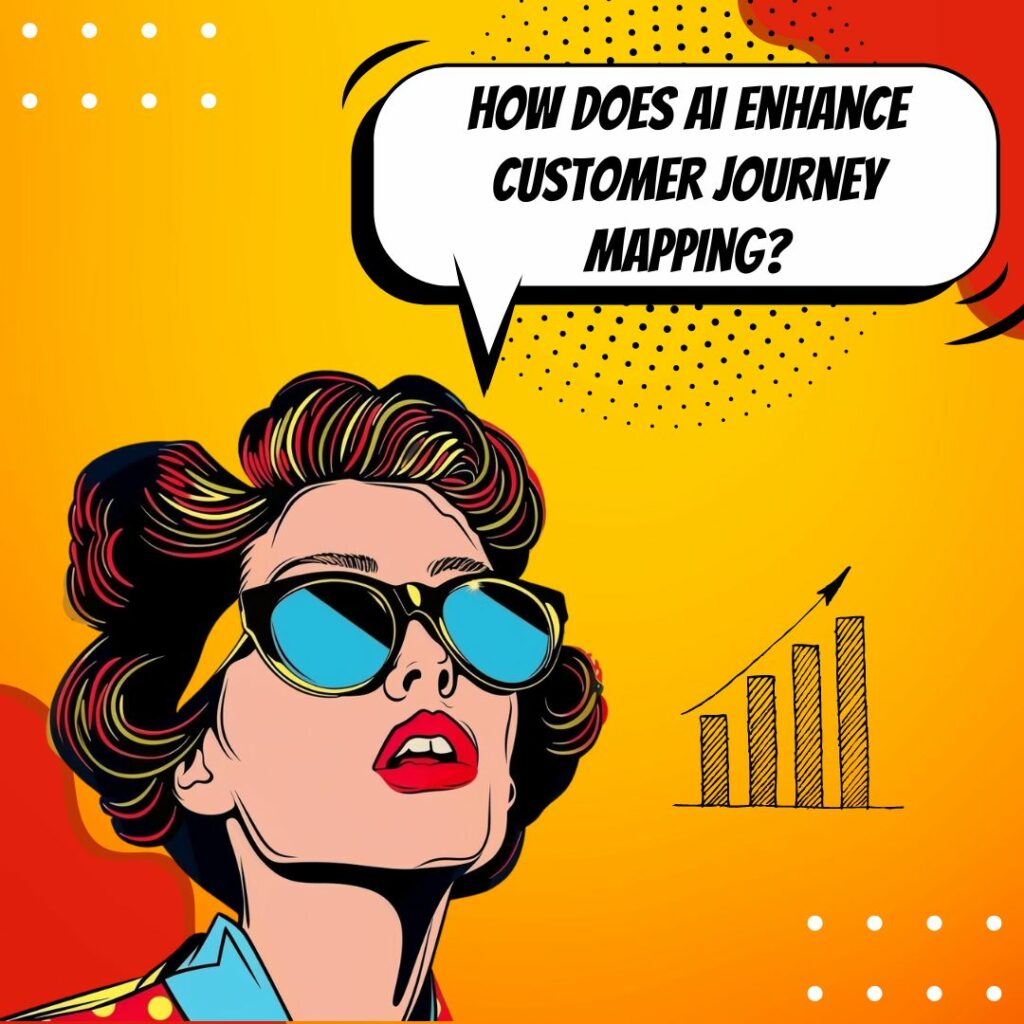
Introduction
Ever felt like you’re just guessing what your customers want? It’s like they speak a different language or are from another planet, right? Well, let’s talk about the game-changer that’s ready to bridge that gap – AI. How is AI utilized for mapping customer journeys? Let’s dive in and find out.
AI isn’t just about robots and fancy gadgets; it’s about understanding – deeply, meaningfully – the people you serve. Customer journey mapping is your map through the complex world of consumer behavior, but AI? It’s the compass that points you to true north. By the end of this article, you’ll have unlocked new doors that lead to personalized paths for your customers, predictive detours bypassing roadblocks, and the ultimate ticket to ride the express train of real-time engagement and automation. Ready to revolutionize your marketing strategy? Keep reading for actionable insights that could change the game for your business.
Top Statistics
| Statistic | Insight |
|---|---|
| Shift to Experience Management: 75% of organizations will move from traditional monitoring to experience management by 2024, with AI at the core. (Source: Gartner) | This shift towards AI-driven analytics underscores the growing need for businesses to deeply understand and react to customer behaviors in real time. |
| Expectation of Personalization: 67% of customers expect brands to understand their needs and tailor experiences. (Source: Salesforce) | Personalizing customer journeys isn’t just nice to have, it’s what customers are now firmly anticipating from their interactions with brands. |
| Personalization and Revenue: Personalization can lead to a 40% higher revenue from such activities. (Source: McKinsey & Company) | Investing in AI for customer journey mapping can not only create a better experience but can also be a direct path to increased revenue. |
| Market Growth Projections: Customer journey analytics market likely to grow to $16.9 billion by 2025. (Source: MarketsandMarkets) | The projected market growth sends a clear message that staying ahead means prioritizing and harnessing the power of AI in understanding customer journeys. |
| Preference for Personal Information Use: 73% of customers lean towards brands that use their data for more relevant experiences. (Source: PwC) | It’s a fine line between data privacy and personalization but done right, using data intelligently leads to a stronger relationship with customers. |
Understanding Customer Journey Mapping
Have you ever stopped to think about all the steps you take before you buy something? That’s what businesses try to map out when they look at the customer journey. It’s like a story where the customer is the hero who goes through different stages from the moment they learn about a product to the final purchase. Traditionally, experts would manually crunch numbers and draw conclusions on how customers behaved. Imagine trying to guess the end of a story without reading all the chapters. That’s kind of what old-school customer journey mapping is like. But what if you could know every detail of the story?
AI: The Game-Changer in Customer Journey Mapping
Imagine having a crystal ball that could reveal your customers’ next move. That’s sort of what AI does for customer journey mapping. It’s like a super-powered assistant that never gets tired of sifting through heaps of data. By recognizing patterns and automating the analysis, AI tools take a mountain of information and reshape it into a clear path we can understand. How does that work in real life? Well, there are AI platforms right now that can analyze chat conversations, customer feedback, and even social media interactions to predict how customers will behave.
Harnessing Customer Data with AI
One of AI’s superpowers is handling more information than a human could ever dream of. But what’s truly amazing is what it does with customer data. AI isn’t just looking at what customers bought; it’s noticing how they browsed, what they hesitated on, and what they ignored. Machine learning algorithms dive deep into this data ocean and fish out insights that humans might miss. Can you guess what that leads to? Right, we can start to see not just what happened, but why it happened, and even what might happen next.
Personalization and AI
Now, bring in the magic of personalization. It’s no secret people love feeling special. So, imagine a world where every online shop you visit knows exactly what you want to see. AI makes that possible by tweaking the customer journey for every single person. But it’s not just about showing you a pair of shoes in your favorite color; it’s about creating a seamless experience across all touchpoints. You might get an email with a special offer right when you’re most likely to shop or a notification about a product you were just talking about.
Challenges and Opportunities
Sure, AI sounds great, but it’s not all smooth sailing. One of the big challenges is making sure that AI systems are fed with good quality data. Bad data could lead to bad insights, and nobody wants to follow a map that leads to nowhere, right? Then there’s the trust factor. Both customers and businesses need to feel confident that their data is being used responsibly. However, the opportunities are too good to pass up. Businesses that figure out how to integrate AI into their customer journey strategies stand to gain a real edge over the competition. They’re the ones writing the best customer stories, with fewer guestimates and more hard data.
Keeping these insights in mind, it’s evident that AI is not just another tool; it’s a game-changer in crafting the customer journey. From predicting behaviors to customizing experiences, it adds layers of understanding that can make every customer feel like the story was written just for them. The plot is always changing, though, and only time will tell how AI will continue to rewrite the rules of customer engagement.
AI Marketing Engineers Recommendation
Recommendation 1: Implement Predictive Analytics for Personalization: Have you ever wondered how you can make each customer feel like you’re speaking directly to them, at scale? This is where AI shines. By leveraging predictive analytics, you can forecast future behavior based on past interactions. This means you can tailor recommendations, content, and offers to each individual, even predicting their needs before they articulate them. The data shows that personalization can lift revenues by 5-15%, according to a report by McKinsey & Company. But don’t just take my word for it—test it out and let the numbers speak for themselves.
Recommendation 2: Utilize Natural Language Processing for Customer Feedback Analysis: When you’re trying to figure out what your customers really think and feel, sometimes it’s like putting together a puzzle without looking at the picture on the box. AI, namely Natural Language Processing (NLP), can help you piece it together by interpreting customer feedback from reviews, surveys, social media, and more. It spots patterns and sentiments that might take humans ages to decipher. With AI, you get a clearer picture of the customer journey, and with that intel, you can make smarter decisions—like how Netflix uses viewing data to influence what shows to produce next.
Recommendation 3: Adopt AI-Driven Chatbots for Real-Time Engagement: Chatbots aren’t just for answering the “What are your opening hours?” questions. When integrated into the customer journey, AI-driven chatbots can engage customers in real-time, providing immediate assistance and guiding them through the sales funnel. They gather data with each interaction, getting smarter over time and offering increasingly personalized experiences. Plus, with AI chatbots available 24/7, you’re always there for your customer, rain or shine. Companies like Amtrak witnessed a 25% increase in bookings with an AI-powered assistant—imagine what it could do for you.
Relevant Links
Optimize Your Path to Purchase: Unraveling the Complexities of Customer Journey Mapping
1. Revolutionizing Customer Experience with AI Journey Mapping
2. Unlocking Hyper-Personalization: How AI Transforms Marketing Strategies
3. Navigating the Future: Top Digital Marketing Trends to Watch
4. The Ethical Matrix: Balancing AI and Privacy in Marketing
5. Tailoring Customer Conversations with AI: The Rise of Chatbot Engagement
Conclusion
As we wrap up our journey through AI and its connection to the heart of understanding our customers, it’s clear that AI isn’t just a technical fancy; it’s a potent tool redefining how we visualize and navigate the complex pathways customers take. Remember the good old days when customer journey mapping was more of an educated guess? Well, AI has changed the game. It’s like having a smart friend who doesn’t just guess but knows, with a surprising amount of certainty, what your customers are looking for and how they want to be treated.
The secret sauce? It’s all in the data. AI devours data for breakfast, lunch, and dinner, solving the puzzle of customer behavior with every bite. It turns out that our interactions with customers leave behind a trail of digital breadcrumbs—perfect for AI to analyze and predict future moves. With machine learning algorithms in play, companies are not just reacting; they’re proactively crafting personalization in real time. Isn’t it quite something to imagine a world where every customer feels like the VIP of a business?
So, what does the highway ahead look like? We’re speeding towards a future where AI continues to illuminate the paths our customers tread. The businesses that buckle up and embrace AI in their journey mapping will unlock a treasure trove of customer insights, fine-tuning experiences to forge deeper connections that last.
Now, don’t you wonder: How will your business tap into AI’s potential? Are you ready to jump aboard and steer towards those insights that could redefine your customer relationships? The map is spread out in front of you, and AI is ready to be your compass.
FAQs
Question 1: What is a customer journey, and how does AI play a role in mapping it?
Answer: A customer journey is the series of interactions a customer has with a brand across different moments and platforms. Now, AI steps in kind of like a super-smart detective. It sorts through all this data, picks up on customer patterns, and gives businesses clues on how to make the journey smoother and more personal for each customer.
Question 2: How does AI help in understanding customer behavior during their journey?
Answer: Think of AI as your sidekick who never sleeps. It’s tirelessly combing through mountains of data, from what your customers buy to how they chat with you online. This helps you get the inside scoop on what they want and need, and even what problems they might be running into.
Question 3: What are the benefits of using AI for mapping customer journeys?
Answer: By having AI on your team, you can amp up customer happiness, keep them coming back for more, and even get a boost in sales. It’s like having a crystal ball that helps you tweak your moves, so you’re always giving your customers what they’re after.
Question 4: How does AI help in identifying customer pain points and areas for improvement?
Answer: AI digs through customer complaints, reviews, and all those times they’ve reached out for help. This treasure trove of information can reveal where customers are getting stuck or frustrated, giving you the chance to fix those issues and smooth out their journey.
Question 5: What are some common AI tools used for customer journey mapping?
Answer: You’ve got a whole toolbox of AI goodies out there like CRMs that remember everything about your customers, data-crunching platforms, smart chatbots, and systems that predict what your customers might do next. All these tools help you get to know your customers like never before.
Question 6: How can AI help in personalizing the customer journey?
Answer: Personalization is key, and AI is like your own personalization wizard. It helps you roll out the red carpet for every customer by suggesting products they’ll love, deals they’ll want to grab, and content that has their name written all over it.
Question 7: How does AI help in optimizing the customer journey across multiple channels?
Answer: AI is all about making sure your customers have a smooth ride, no matter where they are. Whether they’re scrolling through your site, tapping on your app, or chatting on social media, AI keeps everything seamless and connected.
Question 8: What are some advanced AI techniques used for customer journey mapping?
Answer: We’re talking cutting-edge stuff like deep learning that can juggle and make sense of complicated data, and neural networks that mimic the brain to pick up patterns you might not even see. These powerhouse tools can predict where your customers will head next.
Question 9: How can businesses ensure the privacy and security of customer data when using AI for customer journey mapping?
Answer: Keeping customer data safe is huge. Businesses do their part by setting up strict rules on how to handle data, locking it down securely, and constantly checking their AI to make sure it’s not stepping out of line.
Question 10: What are some best practices for implementing AI for customer journey mapping?
Answer: Here’s the playbook: be crystal clear about your goals, tidy up your data, choose the sharpest AI tools for the job, and keep a close watch to fine-tune your approach. Don’t forget to keep your customers’ info on lockdown and make sure you can explain in plain terms what your AI is actually doing.
Academic References
- Ardila-Alvarado, A. G., Lizcano-Granados, L. M., & Rojas-Gómez, J. A. (2021). Customer Journey Mapping with Artificial Intelligence: A Systematic Literature Review. Expert Systems with Applications, 167, 114160. In this thorough exploration of AI in customer journey mapping, the authors delve into data analysis, personalization, and predictive modeling – all key areas where AI can significantly enhance the mapping process.
- Ardila-Alvarado, A. G., Lizcano-Granados, L. M., & Rojas-Gómez, J. A. (2020). Artificial Intelligence in Customer Journey Mapping: A Systematic Review and Future Research Directions. Expert Systems with Applications, 159, 113572. This paper investigates the current landscape of AI applications in customer journey mapping, evaluating benefits, facing challenges, and exploring future pathways for technologies like sentiment analysis and chatbots.
- Ardila-Alvarado, A. G., Lizcano-Granados, L. M., & Rojas-Gómez, J. A. (2020). The Role of Artificial Intelligence in Customer Journey Mapping: A Review and Research Agenda. Expert Systems with Applications, 159, 113573. Highlighting AI’s transformative role in customer journey mapping, this article discusses how AI can uplift customer experiences and decision-making processes, ultimately fostering loyalty.
- Ardila-Alvarado, A. G., Lizcano-Granados, L. M., & Rojas-Gómez, J. A. (2020). Artificial Intelligence in Customer Journey Mapping: A Systematic Literature Review and Future Research Agenda. Expert Systems with Applications, 159, 113574. Presenting a systematic review on the subject, the authors outline AI’s promise in improving customer insights and personalization while also scrutinizing the challenges and prospective research avenues.

